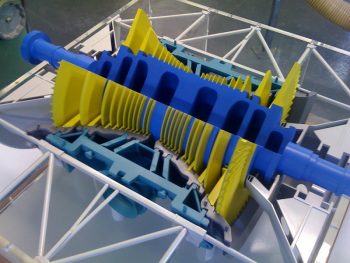
The modern manufacturing industry would not be what it is today without precision engineering. Manual manufacturing is just not able to cope with the low tolerance to measurement deviations and need to consistently reproduce the exact same detail over and over again. Only precision engineering can handle the demands of technology for finer and finer detail and simultaneous requirement for more and more mass production.
Simply put, the more precise the requirements of modern machinery, the more precise the requirements of the machinery used to make that machinery becomes. Think of the tiny parts inside smartphones and imagine the precision required to create those compared to creating the part of for example an olden day printing press.
Precision engineering uses computer programmes to outline processes and so can be incredibly accurate with even the most detailed measurements, down to within 5 microns (a micron is a unit of length equal to one millionth of a metre). What’s more it can then reproduce this same accuracy repeatedly, which allows for the mass manufacturing of even the most intricate and tiny parts.
How is Precision Engineering used?
To give you an idea of how this accuracy is achieved, when a part is made in a precision engineering machine first a 3D image is created of the component to be manufactured. This is then entered into a software programme which calculates the movements, cuts and angles necessary to ensure that it is cut precisely according to the design that is required. The software also ensures that the movements, cuts and angles can be ceaselessly repeated, which means that the component can be recreated over and over again exactly the same.
Apart from the fact that many modern machines wouldn’t even be able to exist without precision engineering, there are many other advantages to using precision engineering in the manufacturing industry.
Longer running life
When parts are created precisely there is less wear and fatigue to those parts and others they interact with as they don’t grate against each other. This offers precision engineered components an extended lifespan compared with manually manufactured parts
Reduced cost
As well as running costs being lowered due to parts having a longer running life, precision engineering can also lower initial costs. When parts are consistently made accurately this hugely reduces reworking and waste or scrapping of components that aren’t quite up to standard. Production is also speeded up as less inspections and quality measures are required. All of this translates to higher profit margins.
Reliability
Mass production means that what initially seems like a small margin of error can translate into very large amounts. Even if only 1% of your products malfunction, if you are producing tens of thousands or millions of that products this adds up to a lot of customer dissatisfaction. Apart from the cost of reimbursing unhappy consumers you may also do damage to your company’s reputation that is beyond repair.
Safety
Following on from reliability, when you eliminate human error you also greatly reduce the chance that a failure or malfunction of your product will cause damage to property or in a worst case scenario actually harm someone. This is something that no company on earth wants to have to deal with, as the damage it does to your brand can be even more costly than any compensation claims that arise.
In summary, it’s very clear that precision engineering is important to the manufacturing industry both in ensuring that required standards are met as well as in making possible the creation of products that before now would have been unimaginable.





